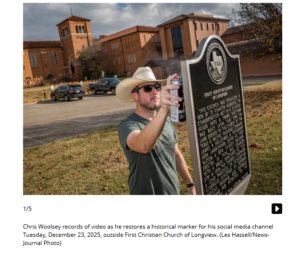Since the dawn of introspection, which predates Homer at least, what collective mind has been more exhaustively or passionately psychoanalyzed than the Mind of the South? In the decades since W.J. Cash probed and disparaged it in his historic 1929 essay for The American Mercury, The Mind of the South has been revised and revisited by armies of Southern scribes and scholars, and still most of us are unconvinced that we’ve got it right. The Southerner’s tireless search for his identity has been viewed ironically by outside observers — no one has ever written about the “Mind of the Midwest” — and there is no Fellowship of Northern Writers who meet and drink and apply Freud’s tools to the works of Hawthorne or Melville. But I’m in no position to join the ironists; I devoted large sections of two books to this unique obsession, and have addressed it repeatedly in the pages of the Oxford American.
As a troubled South pursues its self — its soul — deep into the 21st century, there’s no better place to start than Cash, that doomed and prescient native of Gaffney, S.C., who is still remembered by Southern diehards as a traitor to his people. It’s significant that his original essay was published just before Oct. 29, Black Tuesday, when the stock market crashed and launched the Great Depression, the national ordeal that distracted America from so many of the terrible things that happened in the Jim Crow South. Another significant footnote is that Cash’s editor at the Mercury was H.L. Mencken, whose notorious 1917 diatribe, The Sahara of the Bozart, argued persuasively and hilariously that the South possessed very little mind worth analyzing.
The search for the Mind of the South has engaged each generation since poor Cash threw down his gauntlet. This spring there are two new books by liberal white journalists from the Deep South, honest minds both, that deserve more critical attention than they’re likely to receive.
Tracy Thompson, an Atlanta native and former Constitution reporter now based in Washington, has published a book with the ambitious, seductive title The New Mind of the South. With such a loaded title, Thompson has gripped a monstrously large bull by the horns, though she wrestles it gallantly. More modestly titled and positioned is H. Brandt Ayers’ memoir In Love With Defeat: The Making of a Southern Liberal. Presented as standard autobiography — an aging Alabama newspaperman reflects on his journey — Ayers’s book outweighs Thompson’s because of the history he witnessed and influenced, and the major figures he knew intimately. If you know another Southerner who can reminisce about serious private conversations with Robert Kennedy, George Wallace, Jimmy Carter and Bill Clinton (among many others), I’d like to meet your friend. Ayers, publisher of The Anniston Star, derided as “The Red Star” by Alabama racists, was an actual player in some of the dramas that created the modern South, for better or worse. And he played for the right team.
In Love With Defeat is a book that thoughtful Southerners — and ignorant outlanders — would do well to read and ponder. During the civil rights struggles that began in the ’60s, most whites in the Deep South were faced with the same choices that faced Ayers. Unique to him, as the owner of a small-city daily, were his leverage, access, grave responsibility and direct exposure to the consequences of his decisions. Every Klansman knew what he thought and where he lived. As a journalist who fought this fight only on a typewriter, and from a very safe distance at that, I confess to an exaggerated reverence for those like Ayers who were there, who knew that a bullet through the window or a bomb in the garage were everyday possibilities.
When black people recall the ’60s, it’s not just black heroes and gross white villains they remember, not just Martin Luther King Jr. and Bull Connor. They remember ordinary white people and their choices — the whites who rose to the occasion and the ones who failed to rise. Ayers has every reason to be proud of the role he and his newspaper played in keeping Anniston from becoming a racial battlefield like Selma or Birmingham. But this memoir, unlike so many others, is not an exercise in self-congratulation. In fact, it’s something of a very different order, more of a lament for a bright, lost moment when the much-trumpeted “New South” seemed to promise a racial, social and educational transformation as dramatic as its economic rebirth.
Ayers was a charter member and early president of the L.Q.C. Lamar Society, a biracial conspiracy of progressives who hoped to become a permanent, benevolent force in Southern politics. Founded in 1969 and instrumental in building the coalition that elected Jimmy Carter, the Lamar Society began to lose ground and focus when the Republican Party came south to court the race vote. But before it quietly dissolved, the Society and its lofty aspirations created an ironic, nostalgic bond between its members, who were arguably the best and brightest of a previous generation of Southerners.
The genesis and history of the Lamar Society is a chapter in the Book of the South that I only half comprehended, though I’ve been a part of several conversations among members who assumed that I knew more. Tracy Thompson, a prize-winning investigative reporter, was never a connected insider like Brandt Ayers. A full generation younger, she was a child during the pivotal years of the civil rights movement. But The New Mind of the South is a book that rests on an impressive foundation of research and reporting, including several years of selective travel through the Deep South of her childhood. Thompson, too, has something to teach us.
The chapter she calls “The Big Lie” — in short, the lie that the Civil War had little to do with slavery and that most slaves were overjoyed to be housed and fed — is a disturbing exposé of the United Daughters of the Confederacy, who have often been dismissed as harmless or mildly ridiculous. Actually those magnolia maidens were running a propaganda machine that would have awed Joseph Goebbels, a fact I’m embarrassed to have overlooked or forgotten. They censored textbooks, terrorized educators and paralyzed the fragile Mind of the South with antebellum fairy tales that still circulate today. A Pew Research poll in 2011 indicated that nearly 50 percent of America, including non-Southerners, believed that the Confederacy fought to defend “states’ rights,” not slavery. The Daughters are still at it, according to Thompson, who once attended a UDC event in Virginia where 6-year-old “Children of the Confederacy” in little gray rebel uniforms recited the happy slave myths for their mothers’ approval.
Brandt Ayers’s intention is to tell his own story honestly; Tracy Thompson’s is to make a point — several points, some she makes more convincingly than others. But what they have in common, besides honest minds that most people would label liberal, is their anguish over the towering contradictions Southerners are required to hurdle in order to find peace of mind. Southernness, for unfortunate natives with inadequate denial mechanisms, seems to be a fraternity of torment.
“What’s it like to be liberal-minded in the Deep South?” Ayers asks. “It is to be pulled this way and that by complex, contradictory feelings about your own people — about yourself. It is to feel inescapably, even willfully one with a people who disappoint and hurt you, who make you laugh and bite your lip in frustration, whose charm and generosity live side by side with meanness and bigotry.” From the back pews, a quiet “amen” to that.
I should explain that the phrase “in love with defeat,” a repeated theme that became Ayers’ title, does not refer to the fate or mindset of the beleaguered liberal. He employs it to describe the others, the adamantly unenlightened who cling to the South’s lost cause and all the grim failures that followed from it. In some parts of the homeland, he acknowledges, the long shadow of the War remains a central fact of life. Declaring his own allegiance to the future, not the past, Ayers ends his narrative with a confession that once again, “in the white hair phase” of his life, he’s actively engaged in a quixotic conspiracy — the Blue South Project — which is scheming to break the Republicans’ current stranglehold on the South.
Brandt Ayers makes short work of Big Lie II. He points to George Wallace’s “anti-government racism” as “the ideological cornerstone of the modern Republican Party.” Racists began to switch parties, he recalls, long before Nixon implemented his Southern Strategy. “Unwittingly,” he writes, “Sen. Goldwater led a motley parade of White Citizens Council members, Kluxers and generic racists out of the Democratic Party to install racial prejudice as the Founding Core of the Southern Republican Party.” After a recent conversation with Jimmy Carter in Anniston, Ayers reports that the ex-president is of the same opinion.
“At the end of the day,” Ayers concludes, “progressive voices in the South fell silent because liberals do not burn the fuel — fear and hatred — that keeps the right wing taut, suspicious, alert, and strong.”
If your mind isn’t marinated in sweet tea and blackstrap molasses, the South can exhaust your patience. The war on science is embarrassing enough, with right-wing politicians taking money from Exxon-Mobil to deny climate change while the polar icecaps melt and poor people bake in their skins. Most of a century has passed since H. L. Mencken’s reporting of the Scopes “monkey trial” in Tennessee exposed the South to international ridicule. Yet there are Southern places where Darwin would still be burned at the stake. The governor of Kentucky is offering huge tax breaks to a creationist museum and theme park that will feature dinosaurs on Noah’s Ark. Astronomers have just revised the age of the universe to 13.8 billion years; the Bible Belt, counting Old Testament “begats,” comes up with four to five thousand years. Our fundamentalists still perform theological lobotomies on themselves and their children.
But the white South’s response to Obama, which has turned the map of the South to blood red and the Mind of the South toward the rabid right—this is the backsliding humiliation I didn’t see coming back when I was flirting with optimism. I care about the South, even when my shallow roots are showing. But if “the Deep South is the key to a truly unified nation,” as Ayers asserts, perhaps I despair of the Union. More likely, the Old Confederacy will render itself politically irrelevant long before it’s uninhabitable. We all have bigger fish to fry, like the survival of our species as carbon emissions turn the planet into a colossal sauna. I’d like the USA as a whole to survive me, because my grandchildren and other people I love will still be living there. I’m not sure I still give a damn—a deliberate echo of the pragmatist Rhett Butler—whether what survives includes a recognizable “South.” Maybe the time is ripe to look away from Dixieland.
Oxford American columnist Hal Crowther lives in Hillsborough, N.C., with his wife, the author Lee Smith. This article was adapted from one originally published in the Oxford American www.oxfordamerican.org.
Read more: Anniston Star – Insight Books by two Southerners give insight into America s most distinct region


